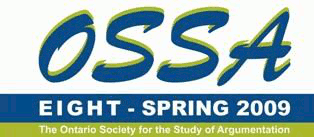
Location
University of Windsor
Document Type
Paper
Start Date
3-6-2009 9:00 AM
End Date
6-6-2009 5:00 PM
Abstract
This essay discusses epistemic analysis of the fallacy of begging the question. In the literature, there are two prominent epistemic explanations of the fallacy, the objective and the subjective. The objective account bases the analysis of the fallacy on the epistemic relations of the propositions used in the argument. The subjective account bases the analysis on the way the arguers acquire their beliefs in the propositions used in the argument. Arguments that aim to show that a propositional analysis is not flexible enough for fallacy analysis have been taken to be a decisive argument for the subjective approach. Yet, the propositional sense seems to address a central intuition about this fallacy. In this essay, it is argued that both analyses need to be retained.
Creative Commons License

This work is licensed under a Creative Commons Attribution 4.0 International License.
Response to Submission
Brian Macpherson, Commentary on Ritola
Reader's Reactions
Brian Macpherson, Commentary on Ritola (June 2009)
Two Accounts of Begging the Question
University of Windsor
This essay discusses epistemic analysis of the fallacy of begging the question. In the literature, there are two prominent epistemic explanations of the fallacy, the objective and the subjective. The objective account bases the analysis of the fallacy on the epistemic relations of the propositions used in the argument. The subjective account bases the analysis on the way the arguers acquire their beliefs in the propositions used in the argument. Arguments that aim to show that a propositional analysis is not flexible enough for fallacy analysis have been taken to be a decisive argument for the subjective approach. Yet, the propositional sense seems to address a central intuition about this fallacy. In this essay, it is argued that both analyses need to be retained.

